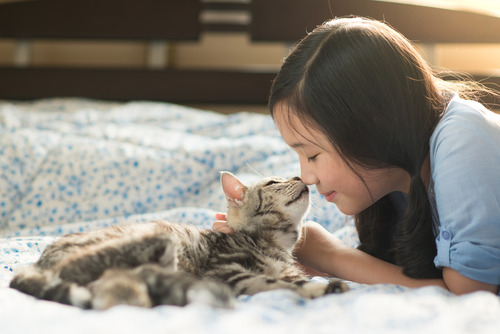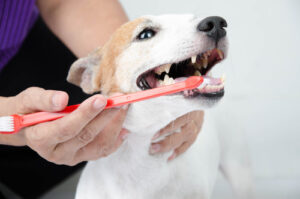When your cat licks you, it may seem endearing or even puzzling. While this behavior is common among cats, many pet owners wonder, “Why does my cat lick me?” Whether it’s a sign of affection, a method of grooming, or a way to communicate, your cat’s licking has meaning. In this blog, we’ll explore the various reasons why your cat licks you and what this behavior signifies.
Your Cat’s Way of Showing Affection
Cats are social animals, and licking is a way for them to express love and strengthen social bonds. In the wild, cats groom each other to create a sense of camaraderie and trust. By licking you, your cat may be trying to replicate this behavior, indicating that they see you as part of their family. This affectionate gesture can be seen as a sign of trust and comfort, making it one of the most heartwarming reasons why your cat licks you.
Sign of Relaxation and Security
You might notice that your cat licks you after a period of play or when you’re both cuddling on the couch. This behavior reassures your cat of your bond and serves as their way of saying, “I love you.” If your cat frequently licks you, consider it a compliment and an indication of your strong connection.
Part of Your Cat’s Grooming Routine
Cats are known for their grooming habits, and licking is a significant part of that. When your cat licks you, they may be treating you as part of their grooming routine. Cats use their tongues to clean their fur, and by licking you, they could be extending this behavior to you. This is particularly common in cats that have been with you for a long time and feel completely at ease in your presence. They may see you as an extension of themselves, and licking you becomes a natural part of their grooming process.
A Natural Instinct
From the moment they are born, kittens are groomed by their mothers, which not only keeps them clean but also helps to establish their scent. As your cat matures, they may continue to lick you as a way to share their scent with you, further solidifying your bond. While this may be endearing, it’s also a sign that your cat considers you a vital part of their world.
Should You Discourage Grooming Licks?
While some owners enjoy the affection, others might find the licking uncomfortable, especially if it’s frequent. If you’d like to reduce this behavior, gently redirect your cat’s attention to a toy or another activity. Avoid punishing your cat, as this could confuse them and potentially harm your bond. Instead, positive reinforcement and gentle redirection can help manage this behavior while maintaining a strong connection with your pet. If you need further guidance, the team at Pet Townsend Veterinary Clinic is available to help.
Communication: What Is Your Cat Trying to Tell You?
Cats may lick their owners to convey a message, whether it’s asking for attention, signaling hunger, or expressing discomfort. For example, if your cat licks you and then immediately runs to their food bowl, they might be trying to tell you it’s time for a meal. Similarly, if your cat licks you and then meows or purrs, they could be seeking your attention or wanting to engage in playtime.
Examining the Context of Cat Licking
Pay attention to their body language and other signals accompanying the licking. If your cat seems agitated or restless while licking you, it might be a sign that something is bothering them. Conversely, if they appear calm and content, the licking could simply be their way of interacting with you. Learning to read these cues can enhance your communication with your cat and help you respond to their needs more effectively.
Responding to Your Cat’s Licking
Acknowledge their needs—whether it’s offering food, engaging in play, or providing comfort. This can reinforce positive communication and help your cat feel understood and cared for. Consistent responses to your cat’s signals can also strengthen your bond and reduce any frustration they might feel if their needs aren’t met. If you’re unsure how to interpret your cat’s licking behavior, our team at Pet Townsend Veterinary Clinic can help provide clarity. Call us at (360) 379-1133 or request an appointment online.
A Coping Mechanism for Your Cat
Just as humans might fidget or chew on their nails when anxious, cats might lick themselves or their owners to relieve stress. If your cat has recently experienced a change in their environment, such as moving to a new home or the introduction of a new pet, they might use licking as a way to cope with these changes. This behavior can be comforting for them, helping to calm their nerves and provide a sense of security.
Monitoring Your Cat’s Behavior
However, it’s important to monitor your cat’s licking behavior to ensure it doesn’t become obsessive. Excessive licking can lead to skin irritation or hair loss, which could indicate that your cat is struggling with more severe anxiety. If you notice these signs, you’ll need to address the source of your cat’s stress and consider seeking advice from a veterinarian. The team at Pet Townsend Veterinary Clinic can help you identify and manage stress-related behaviors in your cat, ensuring they remain happy and healthy. Call us at (360) 379-1133 to schedule an appointment with us today.
Building a Stronger Bond with Your Feline
Understanding why your cat licks you can help you build a stronger bond with them. Whether it’s a sign of affection, a part of their grooming routine, or a way to communicate, recognizing these behaviors can deepen your connection. By responding to your cat’s needs and providing a loving, stable environment, you can enhance the trust and affection between you and your feline companion. If you have concerns about your cat’s licking behavior or if it seems excessive, the experienced team at Pet Townsend Veterinary Clinic is here to help you understand and address your cat’s behavior. Call us at (360) 379-1133 or request an appointment online today.





